HP MSA 2040 Storage review
HP brings 16Gbps Fibre Channel to the masses with the affordable and expandable MSA 2040.
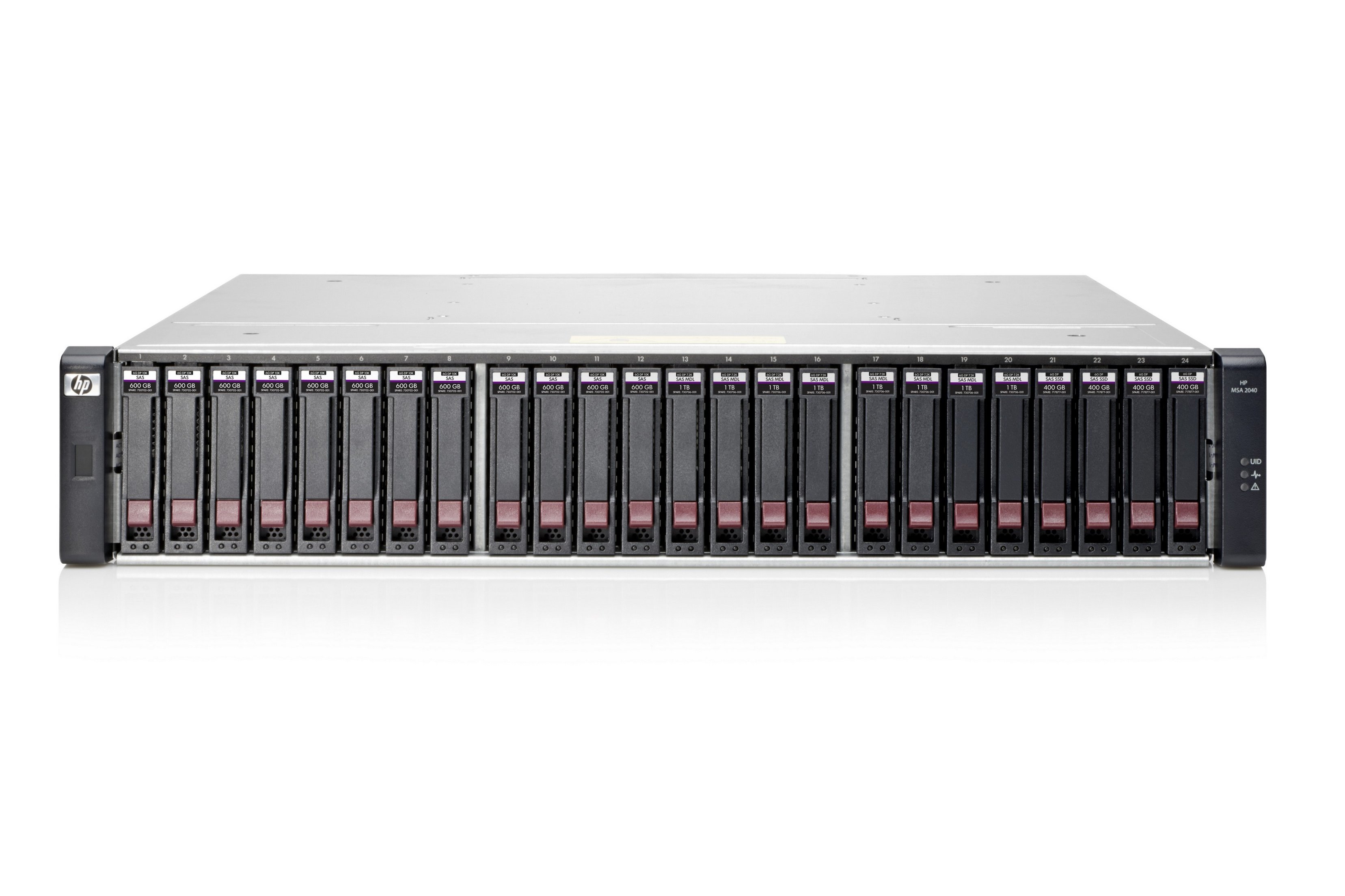

SMBs running apps requiring high speed storage will find the MSA 2040 fits the bill. It' affordable, delivers top performance and is 16Gbps FC ready for so you can ramp up the iOPS.
-
+
Excellent value; Easy deployment; High expansion potential; 16Gbps FC ready; Good performance
-
-
RAID migration not supported

HP's modular smart array (MSA) products have focused on providing SMBs with easy to deploy, scalable and affordable network storage. It now aims to do the same for FC SANs and in this exclusive review we look at itsMSA 2040 which claims to be the first entry-level storage array to support 8/16Gbps speeds.
The 2U chassis is available with either 12 LFF or 24 hot-swap SFF hard disks. You have a wide choice of storage options ranging from 6Gbps SAS2 and SSDs to midline SAS.
The controllers have four FC ports and you can cut costs by starting with one controller and adding a second when required. HP has also released a model with four 12Gbps SAS ports whilst another with quad 10GbE is expected to be available later in the year.
Each controller has 4GB of cache memory and uses a super-capacitor and CompactFlash card to protect the cache contents. In the event of a blackout, cache contents are written to Flash memory using available power in the capacitor which can recharge itself quicker than a standard battery when power is restored.
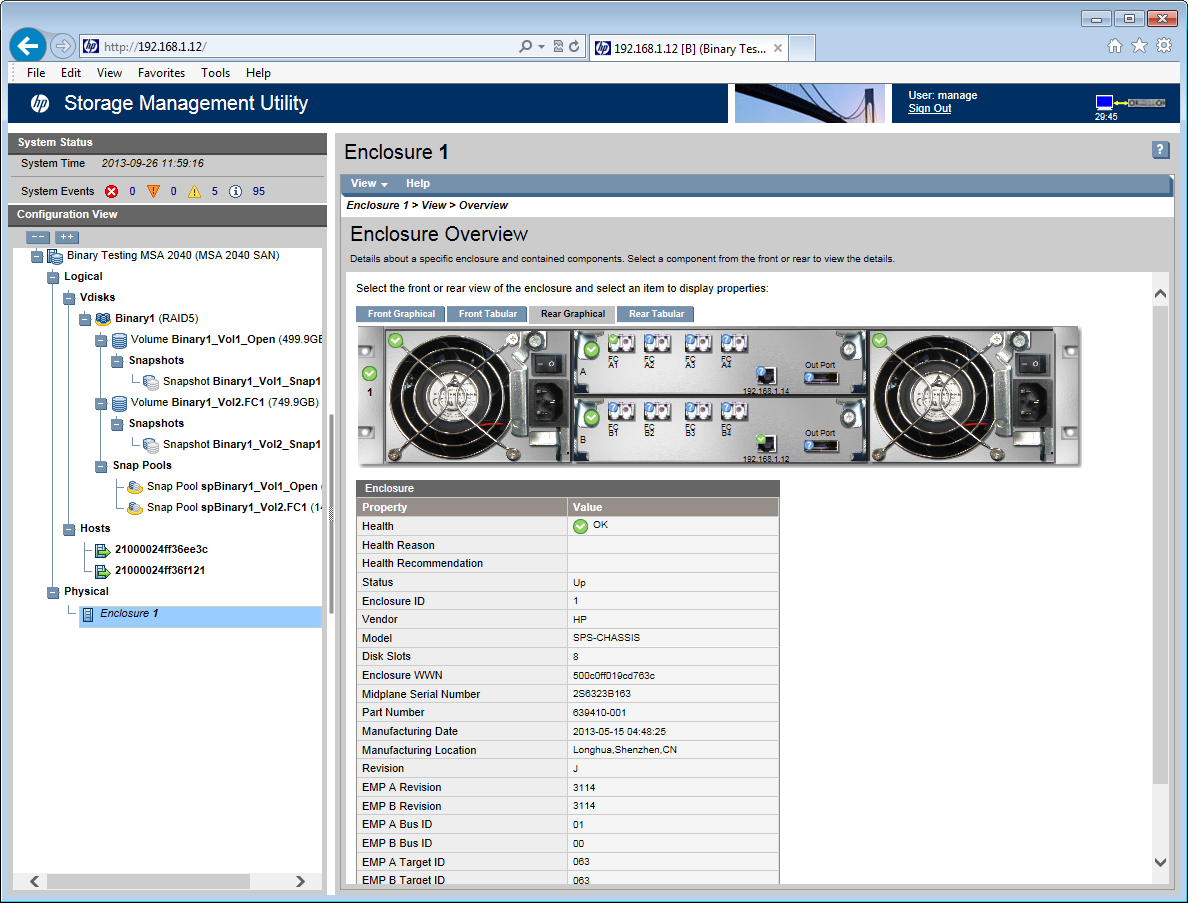
From the well designed web interface you can monitor the PSUs and the status of the controllers
Installation and vdisks
You can configure controllers directly using their mini-USB port and the supplied serial cable. We opted to sidestep this phase by pointing a browser as the controller's IP address and use HP's well designed web interface for all further configuration.
The interface provides a handy graphical view of all physical hardware including the chassis, installed hard disks, controllers and FC ports. You can select any component and drill down further for more information.
Storage is provisioned by creating vdisks (virtual disks), picking physical drives, choosing a RAID array and adding hot-spares if required. If an array becomes full you can expand it into spare drives but you can't migrate to a different type of array later on.
A provisioning wizard makes light work of vdisk creation. It runs you through choosing an array type, member hard disks, the number of volumes it should contain, their size and which FC ports they should be mapped to for host access.
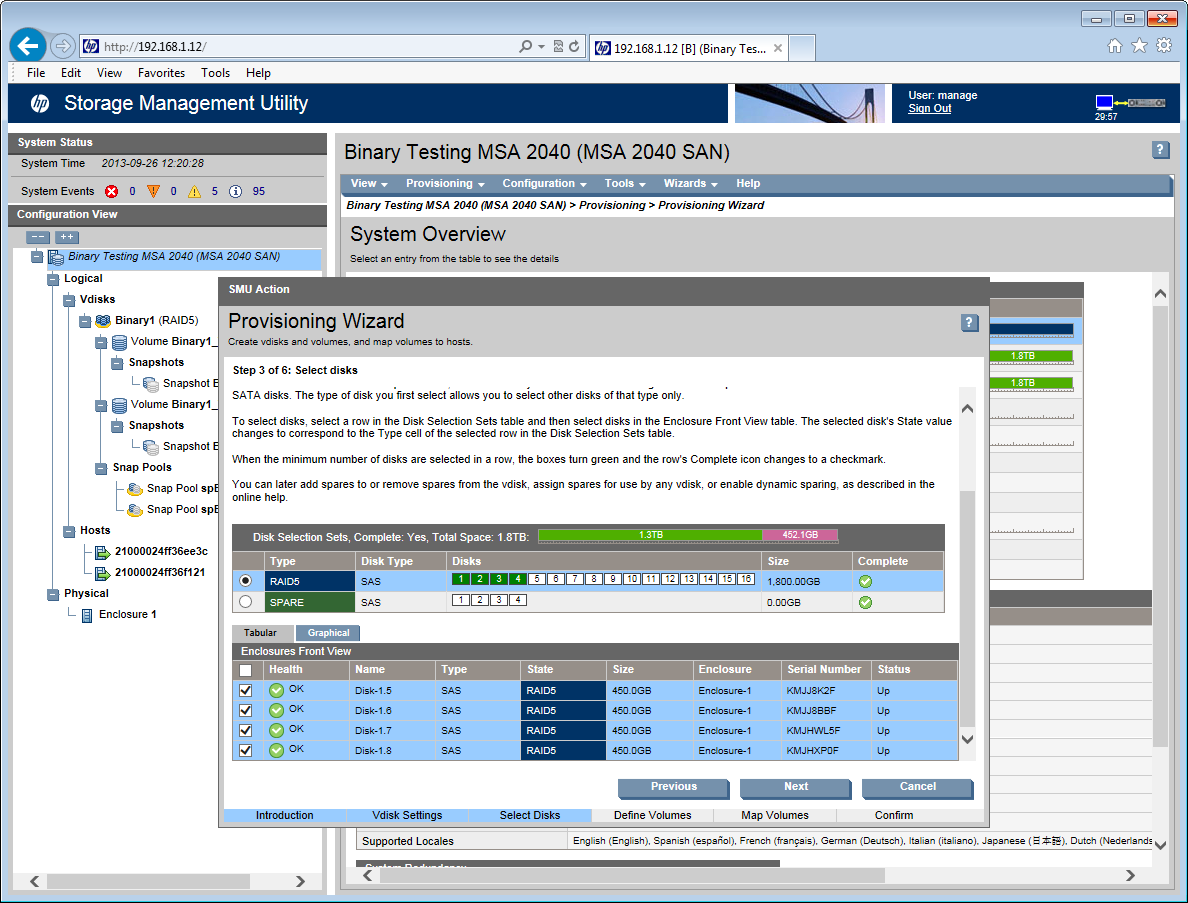
A provisioning wizard helps with vdisk and volume creation along with port mapping
Redundancy and expansion
Along with the dual-hot-plug controllers, the chassis has two hot-swap PSUs which also incorporate cooling fans. Each controller has a 6Gbps SAS interface for daisy-chaining expansion units and with dual controllers installed, you can use multiple paths for fault tolerant links.
The web interface's graphical view shows all attached disk shelves along with their cable links and allows you to swap between them and the main unit. The MSA 2040 disk shelves provide a further 12 LFF drive bays whilst HP's D2700 offers 25 SFF bays and both have dual 6Gbps SAS interconnects.
Expansion potential is great so you'll get a good ROI with the MSA 2040. The system supports a total of 96 LFF or 199 SFF drives and vdisks can span across multiple enclosures. A RAID-5 vdisk can also contain a maximum of 16 drives which is doubled for RAID-50
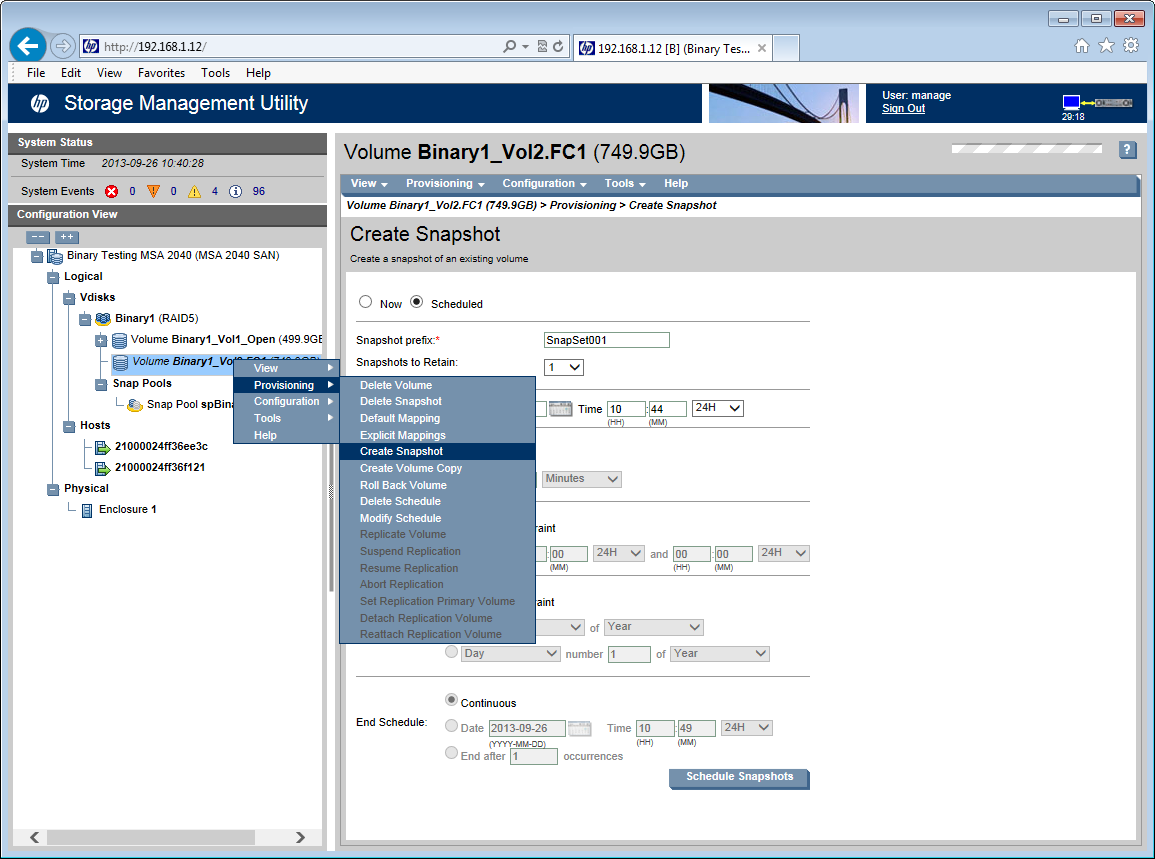
Snapshots are included in the price and can be run manually or to a schedule
Snapshots and clones
Snapshots are used to create point-in-time copies of selected volumes and these are all stored in a separate pool on the appliance. The base price includes a 64 snapshot license which can be upgraded to a maximum of 512.
Users can create snapshots manually or scheduled at regular intervals although we did find snapshot names are limited to 20 characters. Volume rollback is a cinch as you simply select the snapshot you want to revert to.
Volume cloning is included in the price, ticking another box when it comes to value It's also easy to use as you select a volume, choose the copy option from the drop-down menu and run it immediately or schedule it regularly. At any time both snapshots and clones can be mapped to selected FC ports.
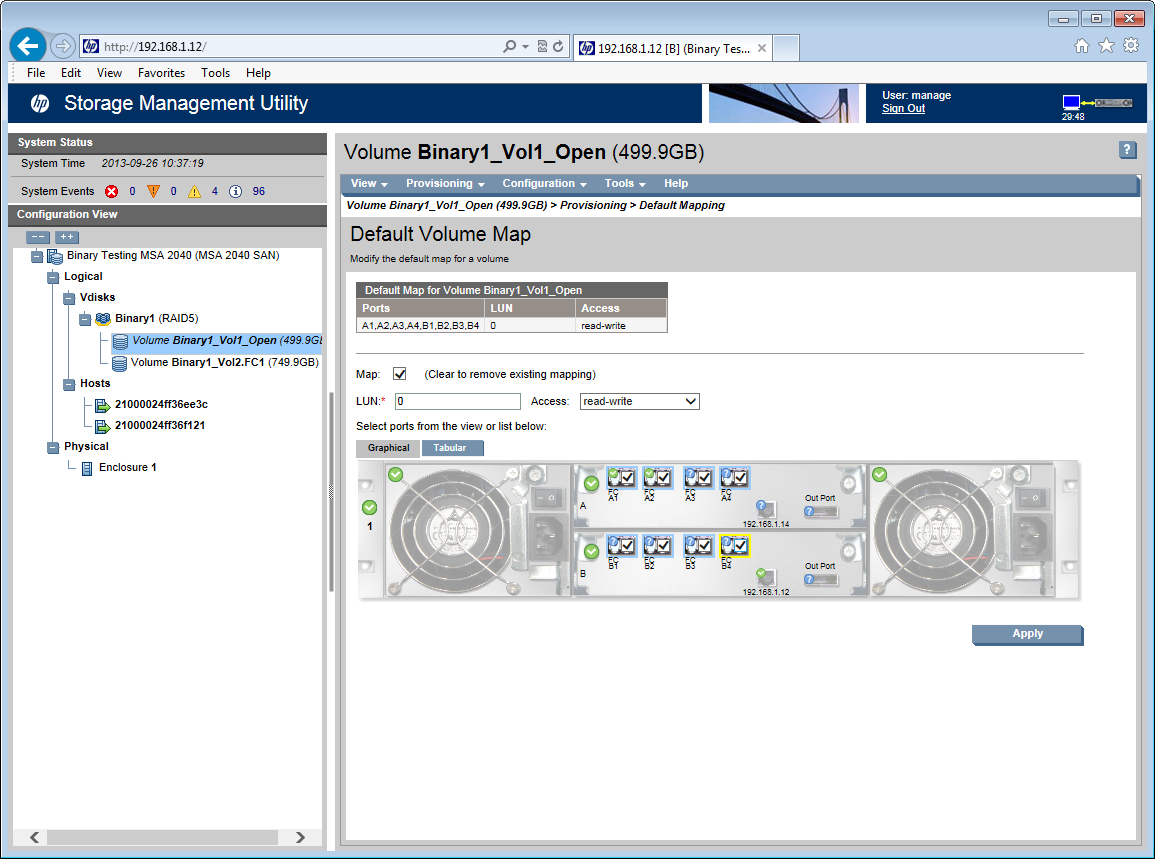
All eight FC ports in dual controller systems are available for use and mappings can be easily defined in the web interface
Performance
For testing we called up a Broadberry dual Xeon E5-2400 1U rack server running Windows Server 2008 R2 and equipped with a QLogic dual-port 8Gbps FC HBA. We created a RAID-5 vdisk from four 900GB 15K SAS drives and mapped a 750GB volume to the server.
Raw read and write performance over 8Gbps FC was fast as with Iometer set to a 32KB block size, we recorded top speeds of 785MB/sec and 732MB/sec respectively. These speeds equate to a 6.1Gbps and 5.7Gbps and are close to HP's claimed sequential throughput figures.
For database performance testing, we used 256 outstanding I/Os, a 16KB block size, 66 percent read, 34 percent write and a 100 percent random distribution. The Iometer settled at a respectable 11,100 IOPS. Conclusion
HP's MSA 2040 delivers a high-speed 8/16Gbps FC storage solution at a price few vendors can match. We found performance to be outstanding, its expandable and the price also includes volume snapshots and cloning.
Verdict
SMBs running apps requiring high speed storage will find the MSA 2040 fits the bill. It' affordable, delivers top performance and is 16Gbps FC ready for so you can ramp up the iOPS.
Chassis: 2U rack
Storage: 12 x LFF or 24 x SFF hot-swap drive bays
Power: 2 x 573W hot-plug PSUs
Two controllers each with the following:
Memory: 4GB cache with super-capacitor and CompactFlash card
RAID support: RAID0, 1, 3, 5, 6 10, 50
Data ports: 4 x 4/8/16Gbps FC
Management: 10/100 Ethernet
Expansion: 6Gbps SAS port
Other ports: Mini-USB CLI port
Snapshots: 64/512 (Standard/Maximum)
Management: Web browser
Get the ITPro daily newsletter
Sign up today and you will receive a free copy of our Future Focus 2025 report - the leading guidance on AI, cybersecurity and other IT challenges as per 700+ senior executives
Dave is an IT consultant and freelance journalist specialising in hands-on reviews of computer networking products covering all market sectors from small businesses to enterprises. Founder of Binary Testing Ltd – the UK’s premier independent network testing laboratory - Dave has over 45 years of experience in the IT industry.
Dave has produced many thousands of in-depth business networking product reviews from his lab which have been reproduced globally. Writing for ITPro and its sister title, PC Pro, he covers all areas of business IT infrastructure, including servers, storage, network security, data protection, cloud, infrastructure and services.
-
 ‘Phishing kits are a force multiplier': Cheap cyber crime kits can be bought on the dark web for less than $25 – and experts warn it’s lowering the barrier of entry for amateur hackers
‘Phishing kits are a force multiplier': Cheap cyber crime kits can be bought on the dark web for less than $25 – and experts warn it’s lowering the barrier of entry for amateur hackersNews Research from NordVPN shows phishing kits are now widely available on the dark web and via messaging apps like Telegram, and are often selling for less than $25.
By Emma Woollacott Published
-
 Redis unveils new tools for developers working on AI applications
Redis unveils new tools for developers working on AI applicationsNews Redis has announced new tools aimed at making it easier for AI developers to build applications and optimize large language model (LLM) outputs.
By Ross Kelly Published
-
 Google layoffs continue with "hundreds" cut from Chrome, Android, and Pixel teams
Google layoffs continue with "hundreds" cut from Chrome, Android, and Pixel teamsNews The tech giant's efficiency drive enters a third year with devices teams the latest target
By Bobby Hellard Published